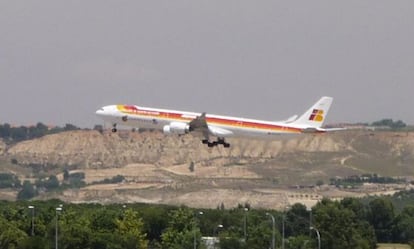24 airlines demanding billions in outstanding debt from Venezuela
Industry summit in Doha laments government’s attempt to get large part of payments written off

Two dozen airlines, including Spain’s Iberia, are locked in conflict with the Venezuelan government over an outstanding debt of more than €3 billion, according to May 31 calculations.
The amount owed by President Nicolás Maduro’s government was a priority issue on the agenda of the 70th International Air Traffic Association’s Annual General Meeting, which took place in Doha (Qatar) between June 1 and 3. The IATA represents 240 airlines, or 84 percent of all air traffic.
Air Canada has been waiting the longest to receive the payments. The last time the Venezuelan government handed out a check was in October 2012.
IATA executive director Tony Tyler said the conditions Venezuela was trying to impose on the negotiations with the airlines were “unacceptable.”
“They are blocking us and one of the reasons is that they have very little foreign currency left for the airlines, which are conducting their business in a legitimate way,” he told EL PAÍS at the Doha summit.
The genesis of the crisis is the currency controls introduced by Hugo Chávez in 2003. International airlines sell their tickets in bolívares, the Venezuelan currency, and in order to send their profits back to headquarters they must first exchange the bolívares at the official state-controlled exchange rate. This operation must first be greenlighted by Venezuelan authorities, who also hand over the foreign currency.
The payments were kept up until 2012. That year, when Hugo Chávez won his last elections, public spending grew exponentially. Despite average annual revenues of $100 billion for oil exports, Caracas started to have trouble meeting its foreign currency commitments. Payments to airlines started getting delayed, then were suspended altogether.
While the economic crisis was developing, Venezuela was forced to devaluate the bolívar repeatedly. Throughout the last two years it concealed these devaluations through the introduction of various official taxes.
Negotiations are now stuck on the issue of what exchange rate the payments should be calculated against.
Transport Minister Hebert García Plaza, who is the Venezuelan government representative at the negotiating table, has announced at least two global agreements with civil aviation creditors since January of this year, but both have failed because of lack of payment.
A Venezuelan who wants to go to Canada or Italy no longer has a direct flight to those countries
Since then García Plaza, an army general, has decided to force individual airlines into partial agreements. The minister has announced deals with six of the 24 carriers: AeroMéxico, Tame Ecuador, Avianca, Tiara Air, Insel Air and Aruba Airlines. According to the official version of events, the Maduro administration has cancelled all accumulated debt from 2012 and 2013. Except for Avianca, the others were owed smaller amounts of money.
The situation of Tame Ecuador is a case study. The flagship airline’s president is Ecuadorian leader Rafael Correa, a close ally of Venezuelan president Nicolás Maduro. For a few days in January, Tame interrupted its service to Venezuela over the debt dispute, although political considerations prevailed and the route was reopened.
At the Doha summit, IATA leaders expressed concern over the money owed them, and over future air links with Venezuela. For now, Air Canada and Alitalia have suspended all flights to the country, and 11 other carriers have reduced their capacity between 15 and 78 percent.
“It’s a significant risk,” explains Peter Cerdá, IATA’s regional vice-president for Latin America. “For now, a Venezuelan who wants to go to Canada or Italy no longer has a direct flight to those countries. By having to fly through the US or Spain, tourists and business travelers face greater complications and may choose a different destination, which can have a significant impact on the economy.”
The case of Iberia
For now at least, Iberia is planning to stay in the Venezuelan market. “We have been operating in Venezuela for a very long time,” said Fredéric Martínez, Iberia’s director for Latin America, in statements to news agency Efe. “It is a really important market for us, historic from every point of view, and we are adapting to a situation that is not easy.”
Venezuela’s debt is having “a significant impact on the airline,” added Martínez, who would not offer figures, saying they were confidential.
But IATA says that after negotiating reduced amounts following demands from the Venezuelan government, the payments are still not coming.
“Payments to date have been very small and throughout that time debt levels have increased from $4 billion to $4.2 billion in the last month,” said an association spokesperson.
“Negotiations are being conducted on a case-by-case basis, but in general terms the Venezuelan government is proposing to write off between 20 and 30 percent of each debt amount,” explains Peter Cerdá. “It has also suggested paying at a different exchange rate from the one at the time the revenues were generated, but that is unacceptable.”
Tu suscripción se está usando en otro dispositivo
¿Quieres añadir otro usuario a tu suscripción?
Si continúas leyendo en este dispositivo, no se podrá leer en el otro.
FlechaTu suscripción se está usando en otro dispositivo y solo puedes acceder a EL PAÍS desde un dispositivo a la vez.
Si quieres compartir tu cuenta, cambia tu suscripción a la modalidad Premium, así podrás añadir otro usuario. Cada uno accederá con su propia cuenta de email, lo que os permitirá personalizar vuestra experiencia en EL PAÍS.
¿Tienes una suscripción de empresa? Accede aquí para contratar más cuentas.
En el caso de no saber quién está usando tu cuenta, te recomendamos cambiar tu contraseña aquí.
Si decides continuar compartiendo tu cuenta, este mensaje se mostrará en tu dispositivo y en el de la otra persona que está usando tu cuenta de forma indefinida, afectando a tu experiencia de lectura. Puedes consultar aquí los términos y condiciones de la suscripción digital.








































